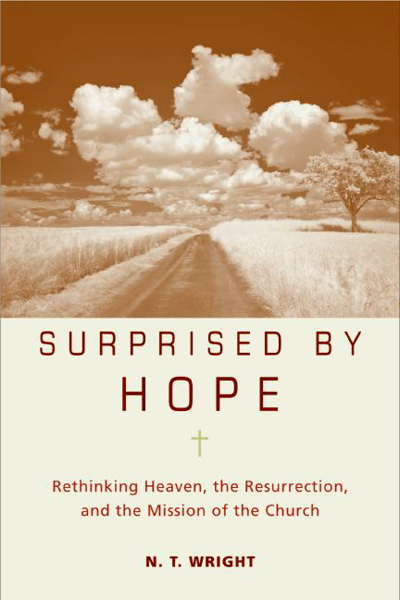
N. T. Wright
Reviewed by: William D. Dennison
Surprised by Hope: Rethinking Heaven, the Resurrection, and the Mission of the Church, by N. T. Wright. Published by HarperOne, 2008. Hardback, 332 pages, list price $24.95. Reviewed by OP minister William D. Dennison.
N. T. Wright's Surprised by Hope is provocative and challenging. Few in our day can match his stylistic mastery. However, his arrogant attitude toward the history of biblical exegesis is also evident. Specifically, he informs us that Reformed theology has perverted the true understanding of the bodily resurrection of believers and the consummation of Christ's kingdom (pp. 202–3). According to Wright, Christians mistakenly look forward to eternal life as a "disembodied soul" in a celestial realm (pp. 80, 148). Platonic body-soul dualism has led many to deny the bodily resurrection in the final coming of God’s kingdom, and thus they have failed to understand the "harmony" between heaven and earth in the consummation. Furthermore, this dualism has led those Christians to be indifferent to "righting the wrongs" in the "real and painful world in which we live," and thus they have failed to "intersect and integrate" heaven and earth into the "transformation" of the present creation (p. 221).
Along with Wright, we must uphold the bodily resurrection (e.g., 1 Cor. 15:35–54; WCF, 32.1–2). But many problems appear within his grid of hope. For example, as Wright rightly attacks Platonic dualism, he subtly adopts an Aristotelian monistic construction of history. Hence, Wright combines the nuances of an earthly utopia arising from secular modernity with a Christian view of the final kingdom of God. The result is a sociopolitical reading of the New Testament in which the "Marxist vision" is "a way forward" toward the "renewal and transformation" of the creation for "justice and beauty" (pp. 222–25). Wright admits that his "scientific" view of history begins in the "human context," and thus his understanding of the final kingdom of God is draped with "space, time, and matter" as we presently know it (pp. 63, 68–69, 211–13, 264–71). The implementation of that final kingdom is clearly tied to the present activity of the church. This "inaugurated eschatology" is brought about by "human works and doing," says Wright as he endorses Crossan's view of "collaborative eschatology." Within this paradigm, Wright's view of justification is exposed; he tells the reader that the "picture of future judgment according to works is actually the basis of Paul’s theology of justification by faith" (p. 139). Why would the future execution of works be the basis—the ground—for justification by faith? Because our future hope—the transformation of creation, and the implementation of justice and beauty—is accomplished by the supplementary works of the believer making the world "right," i.e., making it the way it was "meant to be" (p. 95; on justification, see pp. 161–62, 270).
Wright's revisionist view of New Testament eschatology undermines the gospel of sovereign grace and the doctrine of the fourfold estate of man (WCF, 9). This new transformationalism may well be the emerging heresy of the twenty-first century. It removes the new heaven and earth out of the realm of pure grace and makes the inauguration of the new creation dependent upon the supplementary works of the believer (pp. 143–45, 161, 207–32, 255–70). Wright's monistic "harmony and intersection" of the spiritual and material, i.e., heaven and earth, so controls his thinking that he fails to grasp the eschatological dualism of Scripture—the age to come versus the present evil age. Wright's failure is compounded in that he understands the consummation as a renewed creation of social justice (pp. 102, 152). Instead, the biblical picture of the end is the union of Christ and his church as the heirs of God (John 14:3; Rom. 8:17; 1 Pet. 1:3–5; Col. 3:1–4; Heb. 11:8–16; 12:27–29, 13:14; WSC, 1).
To read Wright discerningly, one needs to be equipped with the knowledge of the Scriptures as summarized in our Reformed standards. A Van Tilian method of critique and a Vosian understanding of eschatology will also benefit the reader. Otherwise, Wright's erudition may seduce you.
September 07, 2025
August 31, 2025
J. N. Darby and the Roots of Dispensationalism
August 24, 2025
August 17, 2025
Reformed Covenant Theology: A Systematic Introduction
August 10, 2025
August 03, 2025
July 27, 2025
© 2025 The Orthodox Presbyterian Church